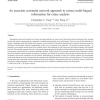714 search results - page 92 / 143 » Lexicographically-ordered constraint satisfaction problems |
CDC
2009
IEEE
13 years 11 months ago
2009
IEEE
Many model predictive control (MPC) schemes suffer from high computational complexity. Especially robust MPC schemes, which explicitly account for the effects of disturbances, can ...
EOR
2007
2007
Solving the short-term electrical generation scheduling problem by an adaptive evolutionary approach
13 years 10 months ago
In this paper, we introduce an adaptive evolutionary approach to solve the short-term electrical generation scheduling problem (STEGS). The STEGS is a hard constraint satisfaction...
DSS
2007
13 years 10 months ago
2007
International crime and terrorism have drawn increasing attention in recent years. Retrieving relevant information from criminal records and suspect communications is important in...
IGPL
2006
13 years 10 months ago
2006
Abstract. k-SAT is a fundamental constraint satisfaction problem. It involves S(m), the satisfaction set of the conjunction of m clauses, each clause a disjunction of k literals. T...
CPAIOR
2006
Springer
13 years 12 months ago
2006
Springer
As many real-world problems involve user preferences, costs, or probabilities, constraint satisfaction has been extended to optimization by generalizing hard constraints to soft co...


